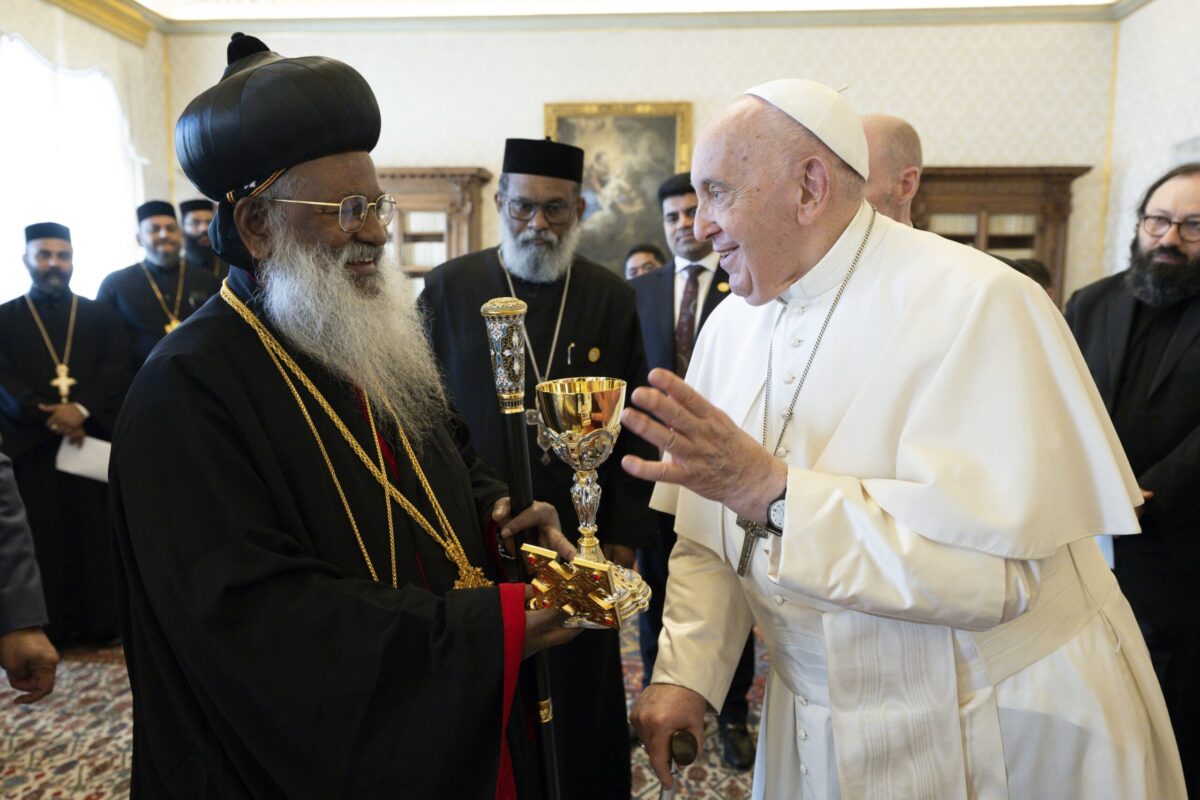By Cindy Wooden, Catholic News Service
VATICAN CITY (CNS) — Pope Francis prayed that Catholics and members of the Malankara Orthodox Syrian Church would recognize the wounds of division they have inflicted on Christ’s body, the church, and come to celebrate the faith together.
“If we touch these wounds together; if, like the Apostle (Thomas), we proclaim together that Jesus is our Lord and our God; and if, with a humble heart, we entrust ourselves to his amazing grace, we can hasten the much-anticipated day when, with his help, we will celebrate the paschal mystery at the same altar,” Pope Francis said Sept. 11 as he welcomed Catholicos Baselios Marthoma Mathews III to the Vatican.
The catholicos is primate of the India-based Malankara Orthodox Syrian Church, which traces its origins to the preaching of St. Thomas the Apostle.
Also known informally as the Indian Orthodox Church, it is one of the Oriental Orthodox churches that broke with the rest of Christianity in the fifth century in a dispute over explaining the identity of Christ. Between 1971 and 1996, each of the Oriental Orthodox churches and the Vatican signed statements affirming their differences were a matter of terminology and not substance.
Pope Francis welcomed the catholicos and his delegation in the library of the Apostolic Palace and prayed with them in the nearby Redemptoris Mater Chapel.
The Malankara Orthodox Syrian Church sent observers to the Second Vatican Council and will have a “fraternal delegate” at the upcoming assembly of the Synod of Bishops, the pope noted.
The Vatican and the Malankara Orthodox Syrian Church in 1989 established a bilateral theological commission, which has focused primarily on pastoral issues, reaching agreements allowing priests of either church to anoint a sick or dying person when a member of the clergy from one’s own church is not available and setting out rules for allowing parishes to share churches and cemeteries.
“These are wonderful agreements,” Pope Francis said, adding he is thankful that the commission’s work is “focused above all on pastoral life, since pastoral ecumenism is the natural way to full unity.”
“It is by moving forward fraternally in the preaching of the Gospel and the concrete care of the faithful that we acknowledge ourselves to be a single pilgrim flock of Christ,” the pope said.
Thanking the catholicos for accepting to send a delegate to the synod, Pope Francis told him, “I am convinced that we can learn much from the age-old synodal experience of your church.”
“In a certain sense,” he said, “the ecumenical movement is contributing to the ongoing synodal process of the Catholic Church, and it is my hope that the synodal process can, in turn, contribute to the ecumenical movement” since both ecumenism and synodality focus on fostering relationships where people walk together as they seek fuller communion with one another.
With communion, he said, comes “a more effective witness by Christians ‘so that the world may believe.'”
“When the Lord showed him his wounds, St. Thomas passed from disbelief to belief by what he saw,” the pope said. “May our shared contemplation of the crucified and risen Lord lead to the complete healing of our past wounds, so that, before our eyes, transcending all distance and misunderstanding, he may appear, ‘our Lord and our God,’ who calls us to recognize and adore him at a single eucharistic altar. Let us pray that this happens soon.”







